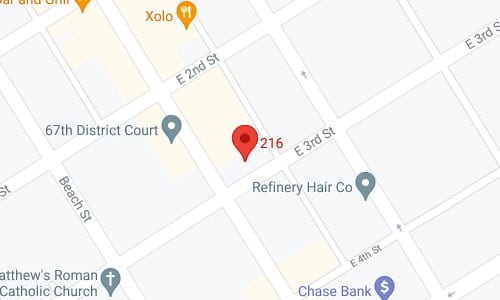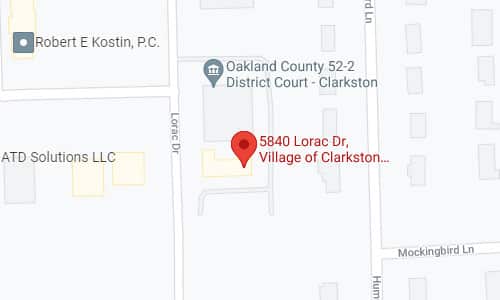Michigan drivers who are convicted of OWI and other drunk driving offenses face suspended driver’s licenses, even for first offenses. Multiple convictions can result in the indefinite revocation of a license. Losing driving privileges can have major repercussions, such as affecting the driver’s ability to commute to and from work. Fortunately, there are ways to restore a suspended driver’s license in Michigan.
Flint driver’s license restoration lawyer Shaun Marks has a strong record of helping Genesee County motorists restore suspended licenses, with a 94% success rate. Contact Shaun today at (866) 969-4891 to learn more about how you get your license back and get back on the road.
Eligibility for Driver’s License Restoration in Michigan
Not all drivers with revoked licenses are eligible for restoration. In order to qualify, you will usually need to wait a full year from the date the license was revoked before you can file a restoration petition. In cases with more extreme circumstances, such as multiple DUIs that involved injuries, you may need to wait five years. A Flint criminal defense attorney or a criminal defense lawyer can evaluate your case and help you determine if you qualify.
In order to maximize your chances of success, you will need to demonstrate a commitment to staying sober. The court will want to see that there is no risk that you will drive under the influence again. In general, petitioners will need to prove that they have stayed sober for at least one year. Proof that you are involved in a recovery program like Alcoholics Anonymous will likely increase your odds of successfully restoring your revoked driver’s license.
How Can You Restore a Revoked License in Michigan?
If you are looking to restore a Michigan driver’s license, you will need to file a request with the Michigan Department of State.
This written request must be submitted alongside several other documents, including:
- Substance abuse evaluation by a state-licensed substance abuse counselor
- 12-panel drug screen
- At least three but not more than six reference letters from family, friends, or colleagues that can attest to your sobriety
- Evidence that proves your sobriety, such as participation in a recovery program, a letter from a drug or alcohol counselor, or self-maintained sobriety
An attorney who has experience in driver’s license restoration can help you compile the documentation you will need for a successful restoration. If the court accepts the petition, you will receive a hearing date in the mail within a couple of months. A driver’s license restoration attorney can provide useful legal guidance throughout each step of this process, from filing the petition to representing you during the hearing and filing an appeal if your request is denied.
Drivers License Restoration Hearings in Michigan
On the day of your hearing, you and your legal counsel will need to prove four things to the hearing officer:
- You have your alcohol or drug abuse problem under control and are likely to remain in control
- There is a low or minimal risk that you will abuse alcohol or drugs again
- There is a low or minimal risk that you will drive under the influence again
- You are able and motivated to drive safely and legally
The hearing officer will usually issue a decision within four to six weeks. Flint drunk driving lawyer Shaun Marks has won 94% of his driver’s license restoration cases, so his clients can expect a strong chance of approval.
Do You Need a Driver’s License Restoration Lawyer Near Me?
The state of Michigan does not require you to have a lawyer when applying for a driver’s license restoration. However, like most legal processes, it is not recommended to represent yourself.
An attorney with extensive experience in the restoration process can help their clients fulfill all requirements and show sufficient evidence for a restoration. Attorneys who specialize in restoration understand how the process works and the inner workings of the system in a way that the average driver does not. This inside perspective can be extremely useful in navigating the system and successfully restoring a license.
Contact Flint Driver’s License Restoration Lawyer Shaun Marks
With over 27 years of experience in this field, Flint driver’s license restoration lawyer Shaun Marks is prepared to help you build a strong case and get back on the road. Shaun believes that individuals with OWI convictions deserve a second chance, but living with a revoked license can make it difficult to maintain employment and get your life back on track.
Fortunately, with the right legal guidance, Michigan residents can get their revoked licenses restored. If you are searching for driver’s license restoration lawyers near me in Genesee County, Flint DUI lawyer Shaun Marks is here to help. To learn more about how to restore a revoked driver’s license after an OWI in Michigan, contact Shaun Marks today at (866) 969-4891.
Drivers License Restoration FAQs
Will a Restored Driver’s License be Restricted?
If you successfully restore your driver’s license, you will not immediately receive full driver’s license privileges. Any Michigan driver who has had a revoked license will receive a restricted license for one year after the restoration. This license is conditioned on no alcohol or drug use and requires.
A breath alcohol ignition interlock device (blow machine) can be installed in any vehicle you are driving. This restriction will be issued by either the Secretary of State or a sobriety court.
After driving with a restricted license for at least one year, you can apply for an unrestricted license. Like the original restoration process, you will need to attend a hearing and meet all of the court’s requirements in order to qualify for an unrestricted license.
Do You Need an Ignition Interlock Device After Restoring a Michigan Driver’s License?
Drivers with restricted licenses that have been restored after OWI convictions must use an ignition interlock device. This breathalyzer system will ensure that you are not intoxicated before you can start your vehicle. Interlock devices also gather data each time you use your vehicle.
If you attempt to drive while intoxicated, the device will log that information and send it to the Secretary of State. In most cases, this will all but eliminate your chances of fully restoring your license. Additionally, you will likely lose your restricted license and have an extremely difficult time restoring your revoked license if you apply a second time.
What Is the Difference Between a Suspended License and a Revoked License?
The terms “suspended license” and “revoked license” are often mistakenly used interchangeably, but they differ from each other significantly. A suspended license is temporary and usually includes a specific timeframe, such as 6 months or one year. A revoked license is indefinite and is typically much more difficult to restore.
First-time OWI offenders in Michigan will usually have their license temporarily suspended. Individuals with a history of multiple OWI offenses may have their license revoked for an indefinite period. Typically, Michigan drivers with two prior OWIs within 7 years must wait at least one year to apply to have their license restored, while those with three or more are usually required to wait at least five years.
What Evidence Can Be Submitted During a Driver’s License Restoration Hearing?
Those who apply to have their driver’s license reinstated following an OWI (or multiple OWIs) must show clear and convincing evidence that they are unlikely to offend again.
This may include evidence that you have sought treatment for alcoholism, such as:
- Attendance records from treatment programs, such as Alcoholics Anonymous
- Records from rehab programs
- Substance abuse evaluations from qualified evaluators
- Letters of sobriety (aka Community Support Letters) from 3-6 friends, family members, and/or coworkers
- Witness testimony from friends, family members, and/or coworkers
- 12-panel urinalysis drug screens
If you are denied at your hearing, you must wait one year before applying again. Experienced Michigan driver’s license restoration lawyer Shaun Marks can evaluate your case and help you gather all relevant evidence for your restoration hearing.
Can You Appeal If Your Drivers License Restoration Was Denied?
Yes, Michigan drivers have the right to file an appeal if their request for a driver’s license restoration was denied during a hearing. This appeal must be filed with the Circuit Court. An experienced Michigan driver’s license restoration lawyer can help you determine whether you have strong grounds for an appeal.
If you attempted to have your license restored on your own and were denied, an attorney may be able to help you prepare a stronger case for the appeal before the Circuit Court. However, if there is no additional evidence to be presented, an attorney may advise you to refrain from filing an appeal.
How to Get Your Suspended or Revoked Michigan Driver’s License Reinstated
The reinstatement process differs depending on whether your Michigan driver’s license was suspended, restricted, or revoked.
Michigan residents with suspended or restricted driver’s licenses may apply for reinstatement after the suspension or restricted period has ended. A reinstatement fee must be paid through Michigan’s Online Services or through the mail. In some situations, you may need to visit an office and reapply for your driver’s license.
For a revoked or denied driver’s license, reinstatement may depend on your driving record. Those looking to restore a revoked or denied license must apply to the Office of Hearings and Administrative Oversight or, in very limited cases, you may be able.to petition the Circuit Court for an appeal hearing.
What Are the Fees For Reinstating a Michigan Driver’s License?
In either case, the reinstatement fee is $125. In some situations, you may owe multiple reinstatement fees. Additional fees may also be due at the time of reinstatement. Some motorists may need to pay for a duplicate license or apply for a new license. The fees are set based on the type of license and whether the applicant has a standard or enhanced license.
In addition, court reinstatement fees will be due before a suspension may be cleared. Those who have been charged with failure to appear in court (FAC) or failure to comply with court judgment (FCJ) owe $45 in court reinstatement fees, while those with a no proof of insurance suspension or hold owe $25.
How Can You Restore a Revoked License in Michigan?
In most cases, a suspended Michigan driver’s license may only be reinstated after the term of the suspension has expired. The driver simply needs to pay the $125 reinstatement fee at a local branch office of the Secretary of State. However, restoring a revoked license is more complicated.
To restore driving privileges after having a license revoked in Michigan, you must file a document known as a petition with the Secretary of State. However, you can only file the petition after waiting for a minimum revocation period, which is typically between one and five years.
How Can a Driver’s License Restoration Lawyer Help?
Flint driver’s license restoration lawyer Shaun Marks provides legal guidance to his clients through each step of the complex restoration process, including:
- Evaluating the case and determining if the client is eligible for restoration
- Gathering the necessary documents and evidence for the restoration hearing
- Helping the client get a substance abuse evaluation from a qualified counselor
- Helping the client understand the restoration process and prepare for their hearing
- Acting as the client’s legal representative during the restoration hearing
- If necessary, appeal a denied restoration with the Circuit Court


